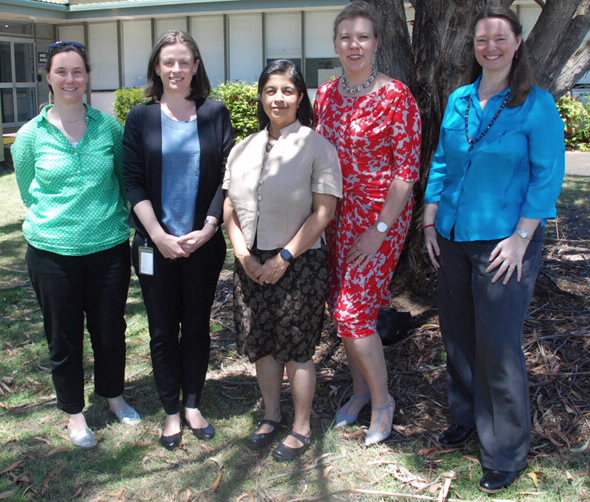In a scintillating talk that bridged mathematical insights, biographical highlights and a topical discussion of gender equity issues, Professor Nalini Joshi delivered a distinguished lecture at ANSTO to a full house on 7 November.
 |
| Prof Nalini Joshi (centre) is welcomed to ANSTO by (left to right) Dr Helen Maynard-Casely, Dr Karina Meredith, Dr Simone Richter and Dr Gail Iles |
In addition to a broad cross section of staff and executives, representatives of ANSTO’s SAGE pilot project, a group of students from Beverly Hills Girls High School also joined the audience to hear from the highly-awarded Chair of Applied Mathematics at Sydney University and Georgina Sweet Australian Laureate Fellow, who is also the co-founder of the SAGE initiative in Australia.
Prof Joshi’s fascination with mathematics, in particular nonlinear algebra, began as a child in Burma when she first discovered three-dimensional pop-up books and striking patterns and symmetries in nature and the man-made world.
She would use her interest in the mathematical concepts of vectors, reflection and translation in original research, which led a unique solution for the Painlevé equations, capturing “the deeper structure behind a two dimensional lattice.” These equations have proved to be highly useful in physics and ubiquitous in their applications.
Prof Joshi had some practical warnings about the dangers of subjective, heuristic judgments over objective approaches that lead to errors both in science and life.
“These in-built assumptions exist in all of us.” In some cases, they take the form of gender or ethnicity bias.
“Gender bias is an example of a systematic error that causes us to lose half the talent available to us in society,” said Joshi.
Although she was able to progress her career and became only the second woman to acquire a PhD in applied mathematics at Princeton University, the first woman to be appointed a Professor of Mathematics at the University of Sydney and the third woman mathematician to be elected to the Australian Academy of Science while raising a family, she wanted better for all women and other marginalised groups.
Doing original, deep math was not enough, there are nuances that exist in building a career,” said Joshi.
Prof Joshi was deeply troubled by statistics of the unbalance in tenure and academic career advancement and widespread systematic issues.
In Australia, only 9 per cent of professors of mathematics are women. In the natural and physical sciences, about 14 per cent of professors are women.
"This is often mistakenly attributed to the 'pipeline effect', for example, that there are not many women studying or entering into research in these fields," said Prof Joshi.
But the figures at the entry level tell a different story: almost 60 per cent of lecturers at the entry point of the academic career in the natural and physical sciences are female.
Australia has had a rise in such numbers at entry levels for decades without discernible change in the percentages of women at the senior levels.
To try and redress some of the imbalance Prof Joshi co-founded with Nobel Laureate Prof Brian Schmidt, the SAGE initiative in Australia.
It was established as a qualification for the Athena SWAN program in the UK to encourage and recognise excellence in women’s employment in STEMM. SAGE now has 40 institutions, including ANSTO, participating in the project.
“We must keep all interested, talented people, who are willing to work no matter what their gender, sexual orientation, identity, ethnicity, race or religion,” said Joshi.


